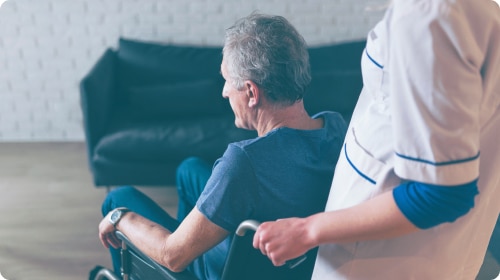Recovery time from a stroke
Stroke recovery time varies greatly among patients, depending on several factors, such as the type and severity of the stroke, the area of the brain affected, the individual’s age, their overall health status, and the quality of immediate medical intervention and subsequent rehabilitation.
Here’s a general timeline, though it’s important to understand it can vary greatly for each person:
First few days after a stroke: Immediate medical treatment is crucial in this period. For some stroke survivors, improvements may be seen in the first few days as swelling in the brain reduces. The extent of the damage can be assessed more accurately after this point.
First few weeks to months: This period typically involves intensive rehabilitation, and significant recovery may occur. This is attributed to the brain entering a ‘hyperplastic state’, in which it adjusts and responds to alterations and injuries brought about by the stroke. During this phase, interventions such as physical, occupational, and speech or language therapies are frequently implemented.
Six months to a year: Although the most rapid recovery typically happens in the first three to four months, many stroke survivors continue to improve in the following months. The rate of recovery may slow down but does not stop.
One year and beyond: Recovery can continue for years after a stroke, and it’s important to maintain a consistent routine of physical, occupational, and cognitive therapy. Improvements might be slower and more incremental at this stage.
It’s important to note that while many stroke survivors regain independence, some may have lasting impairments that require long-term care or assistance.

Goal of stroke recovery
The primary goal of stroke recovery is to help the survivor become as independent as possible and return to their previous level of functioning, or as close to it as they can. The specific goals of stroke recovery, however, depend on the severity and type of stroke and the individual’s health status and lifestyle before the stroke.
Here are some common goals for stroke recovery:
Regaining Physical Function: This can include improving strength, balance, coordination, and mobility. It often involves physical therapy exercises to help the individual walk, move, or use an affected limb again.
Improving Speech and Swallowing: If the stroke affected areas of the brain responsible for speech and swallowing, speech therapy can help improve communication abilities and manage swallowing difficulties.
Improving Cognitive Function: This can involve exercises and activities to improve memory, attention, and problem-solving skills, as well as other mental functions affected by the stroke.
Managing Emotional Health: Stroke survivors often experience emotional changes and mental health challenges such as depression or anxiety. A goal of recovery may be to support mental health through counselling or medication.
Preventing Another Stroke: This involves managing risk factors such as high blood pressure, high cholesterol, diabetes, and obesity. It may involve lifestyle changes, including diet and exercise, and possibly medication.
Promoting Independence: This involves working towards the individual being able to carry out daily activities on their own, such as dressing, eating, and using the bathroom. Occupational therapy can be very helpful for this.
Improving Quality of Life: This is a broad goal that involves enhancing the survivor’s social activities, hobbies, relationships, and overall enjoyment of life. Support groups and leisure activities can help in this area.
Educating the Survivor and Family: Understanding stroke, its effects, and the recovery process is crucial for both the survivor and their family. This can help them make informed decisions about care and treatment, and manage expectations about recovery.
These goals can change over time, depending on the survivor’s progress and changing needs These objectives are frequently accomplished through a multidisciplinary strategy, encompassing the collective efforts of physicians, nurses, physical and occupational therapists, speech-language pathologists, dieticians, psychologists, and social workers. In this recovery journey, the role of the survivor’s family and support system is integral and highly significant.
Furthermore, a multidisciplinary approach that includes doctors, nurses, physical therapists, occupational therapists, speech therapists, nutritionists, home health aide and psychologists is often needed for effective stroke rehabilitation.
Moreover, stroke survivors are at higher risk of having subsequent strokes, so ongoing medical care aimed at stroke prevention is crucial. Lifestyle changes, such as eating a healthy diet, getting regular exercise, quitting smoking, and managing blood pressure, cholesterol, and diabetes, can help reduce the risk of another stroke.
All timelines time from a stroke are approximations, and recovery can be influenced by numerous factors. Always consult with a healthcare professional or a rehabilitation specialist for personalized information about stroke recovery. If you need help in home care for your loved one our home care agency Angel Care Ink. here to help. Reach us by phone at 917-507-7500 or by e-mail at [email protected].

Caring for someone with Alzheimer's disease at home requires patience, understanding, and a well-planned approach. Angel Care Inc. recommends some tips about providing home care for individuals with alzheimers. How to care for alzheimer patients at home: Establish a routine: People with Alzheimer's thrive on routines. Establish a consistent schedule for daily activities such as waking up, meals, and bedtime. This can help provide a sense of familiarity and stability. Create a safe environment: Make the living space safe and secure. Remove tripping hazards, install handrails, use locks on cabinets containing harmful substances, and consider using childproof locks on doors. You may also need to install alarms or baby monitors to ensure their safety. Simplify communication: As Alzheimer's progresses, communication can become challenging. Speak slowly, use simple sentences, and ask one question at a time. Use non-verbal cues like gestures and facial expressions to convey meaning. Maintain eye contact and be patient. Maintain a balanced diet: Encourage a nutritious and balanced diet. Offer a variety of foods and ensure they are easy to eat. Be mindful of any swallowing difficulties or dietary restrictions. Adequate hydration is also crucial, so encourage regular fluid intake. Provide personal care assistance: Assist with personal hygiene activities such as bathing, dressing, and grooming. Offer guidance and support while maintaining their dignity and privacy. Simplify the process by breaking tasks into small, manageable steps. Engage in stimulating activities: Encourage engagement in activities that promote mental and physical stimulation. This can include puzzles, reading, listening to music, gentle exercises, and reminiscing. Tailor activities to their interests and abilities. Manage medications: Ensure medications are taken as prescribed. Organize pills in a pillbox labeled with the days of the week. Consider using reminder apps or alarms to prompt medication intake. Regularly review medications with the doctor or pharmacist to ensure their appropriateness. Seek support: Caring for someone with Alzheimer's can be physically and emotionally demanding. Reach out for support from family, friends, or support groups. Consider respite care services to allow for occasional breaks and self-care. Prioritize safety: As the disease progresses, the person may wander or become disoriented. Install door and window locks, alarms, or a monitoring system to help prevent accidents. Keep a recent photograph and identification information handy in case of emergencies. Maintain regular medical check-ups: Schedule regular visits with the person's healthcare provider to monitor their condition and address any concerns. Keep track of changes in their behavior, sleep patterns, and overall health to inform medical discussions. What are some issues you may come across working for a client with alzheimers patients While providing home health aide for Alzheimer's patients, families may encounter several challenges. Here are some common problems that caregivers often face: Alzheimer's disease affects language and communication skills. As the disease progresses, the person may have trouble expressing themselves, understanding instructions, or engaging in coherent conversation. Behavioral changes, including agitation, aggression, confusion, wandering, and sleep disturbances. These behaviors can be distressing for both the person with Alzheimer's and the caregiver. Managing and addressing these behaviors requires patience, understanding, and sometimes professional guidance. Alzheimer's patients may experience memory loss and confusion, leading to safety risks. They may forget to turn off appliances, leave the stove on, or wander away from home. Ensuring their safety requires implementing measures such as home modifications, supervision, and constant vigilance. It's important for caregivers to seek support, education, and respite care to address these challenges effectively. Consulting with healthcare professionals, joining support groups, and seeking assistance from Alzheimer's organizations can provide valuable resources and guidance. Alzheimer's disease affects each person differently, so it's important to adapt your caregiving approach to meet their specific needs. Stay informed about the disease and its progression to provide the best possible care. If you need support with your problem please contact Angel Care Ink. today by phone at 917-507-7500 or by e-mail at [email protected]

Dementia is a global health challenge that affects millions of individuals and their families. Providing quality care for people with dementia requires a multifaceted approach that encompasses medical, social, and financial aspects. In the United States, Medicaid plays a vital role in supporting dementia care for low-income individuals and families. In this article, we will explore the significance of Medicaid in dementia care, the services it offers, and the importance of ensuring dignity and compassion in the provision of care. Medicaid and Dementia Care Medicaid is a joint federal and state program that provides health coverage for low-income individuals and families. While Medicaid offers a wide range of services, including hospital visits, doctor appointments, and prescription medications, it also plays a critical role in supporting long-term care services, such as those needed by individuals living with dementia. Dementia care often involves a spectrum of services, including medical care, memory support, counseling, caregiver training, and assistance with activities of daily living. Medicaid's coverage for dementia care varies by state, but it typically includes nursing home care, home-based care, and community-based services. These services are crucial in ensuring that individuals with dementia receive the necessary support to maintain their well-being and quality of life. Home-Based Care Medicaid's support for home-based care is particularly significant for individuals with dementia. Many individuals prefer to remain in familiar surroundings, surrounded by loved ones, as they navigate the challenges posed by dementia. Home-based care services covered by Medicaid can include home health aides, skilled nursing services, therapy sessions, and respite care for caregivers. These services allow individuals with dementia to receive the necessary medical attention and assistance with daily activities while remaining in the comfort and familiarity of their own homes. Furthermore, Medicaid's coverage of respite care provides caregivers with much-needed relief, reducing stress and promoting their own well-being. Nursing Home Care For individuals with advanced dementia or those who require round-the-clock care, nursing homes can provide a safe and supportive environment. Medicaid is the primary payer for nursing home care in the United States, ensuring that low-income individuals with dementia have access to these facilities. Medicaid's coverage for nursing home care includes room and board, medical care, rehabilitation services, personal care assistance, and specialized dementia care. It is essential to ensure that nursing homes offer person-centered care that respects the dignity and autonomy of individuals with dementia. NHTD Individuals with dementia can also have support from the NHTD program. Nursing Home Transition and Diversion is a Medicaid Waiver program, the aim of this program is to assist people with disabilities and seniors to live in their homes or community instead of a nursing home. The program can provide funding for assistive technology, which can include devices to help manage safety concerns related to dementia, such as alarms and monitors. The program can also provide funding for modifications to the home to make it safer and more accessible for someone with dementia. This could include things like adding grab bars, improving lighting, or even creating a secure outdoor area. Dementia care near me NY Medicaid plays a crucial role in supporting dementia care for low-income individuals and families. Its coverage of home-based care and nursing home services enables individuals with dementia to receive the necessary support while maintaining their dignity and quality of life. By promoting person-centered care and prioritizing compassion and dignity, Medicaid can contribute to a more inclusive and supportive healthcare system for those living with dementia. It is essential that policymaker. If you need support with your healthcare, please contact our qualified home care agency, Angel Care Inc., located in New York. We will provide all necessary recommendations and offer qualified assistance. Rich us by phone 917-507-7500 or e-mail: [email protected]



